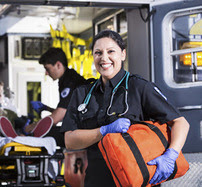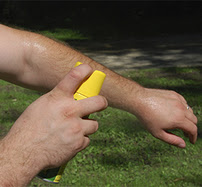

Community Paramedicine and the Changing Face of Pre-Hospital Care
As emergency medical services (EMS) systems evolve from responding to a medical emergencies to providing a broad range of mobile health and clinical services, CMS is looking for innovative ways to enhance paramedic services and prehospital care. Check out these five projects that could help provide a path to better patient care for fewer health care dollars. Learn More >>

EMS Week 2016: Honoring those who Help Protect Health and Keep our Health Care System Strong
As part of EMS Week, Nicole Lurie, Assistant Secretary for Preparedness and Response, and Edward Gabriel, Principal Deputy Assistant Secretary for Preparedness and Response, thank all EMS professionals for the essential role they play in protecting the health of our nation each and every day. Learn More >>

Updating the EMS Agenda for the Future: The Search for Data-Driven Approaches to ImprovementThe EMS community is working to find collaborative solutions to some very tough questions so that they can better provide quality care during disasters and every day. The EMS Agenda for the Future, which has offered guidance to EMS providers and other healthcare professionals since 1996, is about to be revised. Become part of the solution and submit your ideas for making the system better. Learn More >> |

Older Adults: Include Connectedness in your Hurricane PlanOlder adults who are connected to their friends, family and community are less likely to become depressed and more likely to stay healthy during and after a disaster. Take a few minutes to learn how connectedness makes older adults feel happier and more satisfied everyday AND helps them bounce back from a disaster. Learn More >> |

Hurricane Preparedness: Start a Conversation with your Kids using Ready Wrigley!
Talking to your kids about hurricanes or any other emergency can be hard, but research shows that kids who have learned about disasters before they strike are better able to cope. But how can you get that conversation started? Try using the Ready Wrigley coloring books and checklists to help teach your kids about disasters before they strike. Learn More >>

Low Literacy Populations and Disaster Communications: 5 Ways to Bridge the Educational Divide
As disaster health professionals know, information in a disaster can be really complicated. What you might not know is that many people in your community have low literacy levels and can't understand much of the information that is put out before, during and after disasters. Here are 5 things you can do to help people with low literacy levels understand your message. Learn More >>

Preventing the Spread of ZikaZika virus spreads to people primarily through the bite of an infected Aedes species mosquito, though it can also be transmitted sexually. We don't have a vaccine to prevent the spread of the virus, but you can protect yourself in other ways. Be ready to prevent mosquito bites. The species of mosquito that carries the virus is most active during the day, so be particularly careful about protecting yourself and your kids during daytime hours. Learn More >> |






















.png)











No hay comentarios:
Publicar un comentario